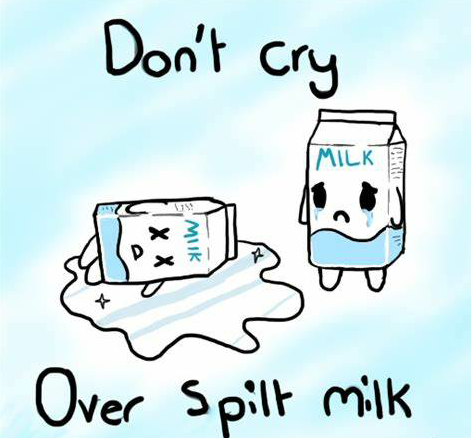(单词翻译:单击)
听力文本
Now, the VOA Learning English program Words and Their Stories.
Okay, who here has never made a mistake?
The answer is, of course, no one.
Mistakes are not just a fact of life, they are an important part of the learning process. However, regretting our mistakes day in and day out is not healthy. We need to learn from them and then move on.
But do not take my word for it. One of America's most famous and influential writers and thinkers, Ralph Waldo Emerson, said it much better than I can.
Before we hear his famous statement, let's talk about some words he used in it.
When Emerson says "blunders and absurdities," he simply means mistakes. To do something filled with peaceful feelings is to do something "serenely." However, to be "encumbered" is the opposite. This means to be heavy and loaded down with things. To Emerson, those "things" are past mistakes, or as he calls them "your old nonsense."
Now, here's Bryan Lynn reading Ralph Waldo Emerson's famous quote.
"Finish each day and be done with it. You have done what you could. Some blunders and absurdities no doubt crept in; forget them as soon as you can. Tomorrow is a new day. You shall begin it serenely and with too high a spirit to be encumbered with your old nonsense."
To this day, many people use this quote to remind themselves not to dwell in the past. When we dwell on something, we think about it constantly. It becomes a distraction and keeps us from moving forward.

Now, this famous quote is useful, but it is a bit long. Perhaps you would rather use a shorter, food-related idiom to help you move on and forget your past mistakes.
In that case you can say, "Don't cry over spilt milk."
When we "cry over spilt milk," we are upset or sad about something bad we have done that cannot be undone. This is another way of saying, "What's done is done. You cannot change the past. So stop thinking about it." If you spill milk, you cannot gather it back up and put it back in the container.
We usually use the expression this way: "There's no use crying over spilled milk." "Spilled" or "spilt" are both okay. Some say, this expression was first used in the mid-1600s in England. Back then, the expression was "no weeping for shed milk."
If old quotes and food expressions are still not working for you, there are other ways to state this idea.
Let's say past regrets continue to trouble your boss. You can use a word we heard earlier – dwell. You might tell your boss: "Don't dwell on the past. You cannot change it, so why worry about it? You must move on and look toward the future."
This is all very polite. And the word "dwell" works well here as it is somewhat formal. It's good for a pep talk with your boss.
But what if one of your close friends is having the same kind of problem? What if this friend has been stuck in the past for far too long? They need a very different type of pep talk. It may be time for you to tell your friend, "Get over it!"
Now, this could sound rude. After all, it is a wake-up call, a warning to change for the better. And those can be hard for people to hear and accept. But if someone has been crying over spilt milk for months, or even years, a wake-up call is necessary.
And that's the end of this Words and Their Stories. Until next time, I'm Anna Matteo.
重点解析
1.day in day out 日日夜夜;日复一日
He works hard day in and day out.
他日复一日地努力工作着。
2.creep in 偷偷潜入;悄悄产生
Insecurity might creep in.
可能会不知不觉地产生不安全感。
3.dwell on 凝思;老是想着
I'd rather not dwell on the past.
我不想再沉湎于过去了。
参考译文
欢迎收听VOA慢速英语《词汇掌故》。
嗯,谁从来没犯过错呢?
答案当然是,人人都犯过错。
错误不仅是生活中的一个事实,它们也是学习过程中的重要组成部分。然而,日复一日地后悔犯过的错误不利于健康。我们要从错误中学习,然后继续前行。
别只听我说,美国最著名且最有影响力的作家和思想家之一拉尔夫·沃尔多·爱默生比我说得好多了。
在听他那句名言之前,让我们先谈谈他使用的一些词。
爱默生说“错误和荒谬”时,他只是指错误。做一件充满平和感的事,就是“从容地”做某事,而“有负担感”则恰恰相反,这意味着沉重,承载了很多东西。对爱默生来说,这些“事情”都是过去的错误,或者是他称之为的“你的陈年老调。”
现在,由布莱恩·林恩诵读拉尔夫·沃尔多·爱默生的名言。
“每一天结束以后,就不再伤心后悔。你已经尽你所能。尽管犯了些错误,也做了荒谬之事。尽快把它们忘记,让生命继续前行。你应该平静地开始新的一天,精神饱满,不要被你那些陈词滥调所困扰。”
时至今日,许多人用这段话提醒自己不要沉湎于过去。当我们沉湎于某件事时,我们会不断地想着它。它会分散我们的注意力,阻止我们前行。
这句名言很有用,但有点长。也许你想用一个简短的、与食物有关的成语来帮助你继续前进,忘记过去的错误。
在这种情况下,你可以说,“Don't cry over spilt milk.”
当我们“为洒了的牛奶哭泣(后悔无用)”时,我们会为自己所做的无法挽回的事而心烦意乱或悲伤。这有另一种说法,“木已成舟,你不能改变过去,所以不要再想它了。”如果牛奶洒了,就不能把它收回来放到容器里。
我们通常这样说:“覆水难收。”用“Spilled”或“spilt”都可以。有人说,这个短语最早出现在17世纪中期的英国。当时,人们的表达方式是“no weeping for shed milk(不要为流出来的牛奶哭泣)。”
如果古旧的名言和用食物的表达方式都不适合你的话,还可以用其他方法来表达这个想法。
比如,你的老板受到过去懊恼之事的持续困扰,你可以用我们之前听到的一个词——dwell(念念不忘)。你可以告诉你的老板:“不要老想着过去,你不能改变它,为什么要为它发愁呢?你必须继续前行,放眼未来。”
这都是很有礼貌的。“dwell”这个词用在这里很好,因为它有点正式,这对鼓舞你老板的士气来说很有用。
但如果你的一个好朋友也遭遇同样的问题呢?如果这个朋友过久地深陷于过往之事该怎么办呢?他们需要一种截然不同的鼓舞士气的对话,也许可以告诉你的朋友,“Get over it!(忘了它吧!)”
这听起来可能显得粗鲁。毕竟,这是让人警醒的话,是让我们朝更好的方向转变的警示。人们可能不愿意听,也难于接受这些话。但是,如果有人为洒出来的牛奶哭了数月,甚至数年,就需要给他敲敲警钟了。
今天的节目就到这里了,下次见,我是安娜·马特奥。


